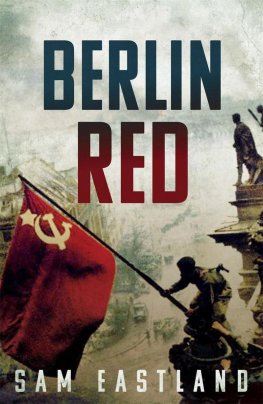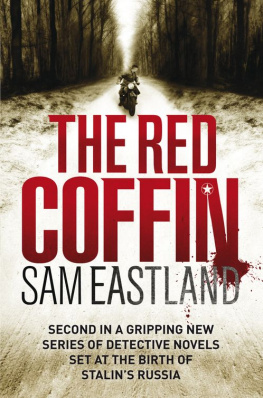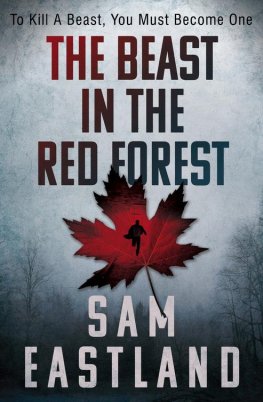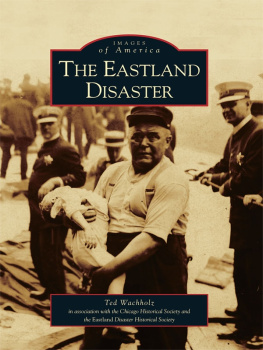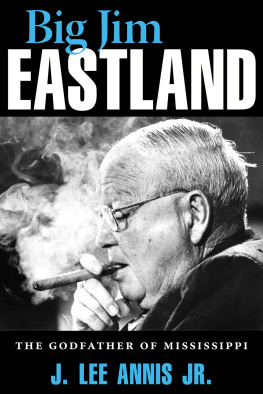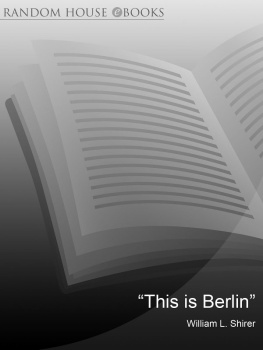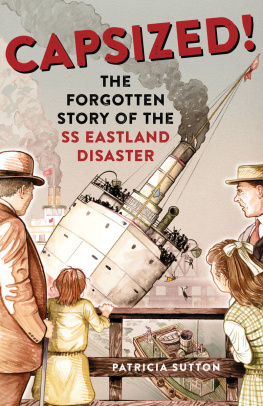Sam Eastland - Berlin Red
Here you can read online Sam Eastland - Berlin Red full text of the book (entire story) in english for free. Download pdf and epub, get meaning, cover and reviews about this ebook. year: 2016, publisher: Faber & Faber, genre: Detective and thriller. Description of the work, (preface) as well as reviews are available. Best literature library LitArk.com created for fans of good reading and offers a wide selection of genres:
Romance novel
Science fiction
Adventure
Detective
Science
History
Home and family
Prose
Art
Politics
Computer
Non-fiction
Religion
Business
Children
Humor
Choose a favorite category and find really read worthwhile books. Enjoy immersion in the world of imagination, feel the emotions of the characters or learn something new for yourself, make an fascinating discovery.
- Book:Berlin Red
- Author:
- Publisher:Faber & Faber
- Genre:
- Year:2016
- ISBN:9780571322374
- Rating:4 / 5
- Favourites:Add to favourites
- Your mark:
- 80
- 1
- 2
- 3
- 4
- 5
Berlin Red: summary, description and annotation
We offer to read an annotation, description, summary or preface (depends on what the author of the book "Berlin Red" wrote himself). If you haven't found the necessary information about the book — write in the comments, we will try to find it.
Berlin Red — read online for free the complete book (whole text) full work
Below is the text of the book, divided by pages. System saving the place of the last page read, allows you to conveniently read the book "Berlin Red" online for free, without having to search again every time where you left off. Put a bookmark, and you can go to the page where you finished reading at any time.
Font size:
Interval:
Bookmark:
Sam Eastland
Berlin Red
9 April 1945, Moscow. His footsteps echoed in the empty street.
Above him, framed by the snub-toothed silhouettes of chimney pots, the darkness shuddered with stars.
With hands shoved deep into the pockets of his coat, Pekkala made his way towards the Cafe Tilsit, the only place open at this time of night.
The windows of the cafe, blind with condensation, glowed from the light of candles set behind them.
Pekkala put his shoulder against the heavy wooden door and a small bell, tied to the handle, clanged as he entered the room. He paused for a minute, filling his lungs with the smell of soup and cigarettes, before heading to a quiet table at the back.
Pekkala had been coming here for years.
Before the war, most of the patrons who wandered in after midnight had been workers coming off their shifts taxi-drivers, whores, museum guards. But there were also those who had no place to live, and some who, like Pekkala, fled whisperings of madness in the quiet of their empty rooms.
Here, at the Cafe Tilsit, alone but without being lonely, they chased all their demons away.
Nine years at a labour camp had taught Pekkala the value of this strange, wordless communion.
Schooled in the art of solitude by the lacquer-black winters of Siberia, he had come to know a silence so complete that it appeared to have a sound of its own a hissing, rushing noise like that of the planet hurtling through space.
Soon after he arrived at Borodok, the director of the camp had sent him into the woods, fearing that other inmates might learn his true identity.
Pekkala was given the task of marking trees to be cut by inmates of the camp, whose function was the harvesting of timber from the forest of Krasnagolyana. In that vast wilderness, Pekkala lacked not only the trappings of a civilised existence, but even a name. At Borodok, he was known only as prisoner 4745.
Moving through the forest with the help of a large stick, whose gnarled root head bristled with square-topped horseshoe nails, he daubed his handprint in red paint on trees selected for cutting. These marks were, for most of the other convicts, the only trace of him they ever saw.
The average life of a tree-marker in the forest of Krasnagolyana was six months. Working alone, with no chance of escape and far from any human contact, these men died from exposure, starvation and loneliness. Those who became lost, or who fell and broke a leg, were usually eaten by wolves. Tree-marking was the only assignment at Borodok said to be worse than a death sentence.
Everyone assumed that Pekkala would be dead before the ice broke up in spring, but nine years later he was still at work, having lasted longer than any other marker in the entire Gulag system.
Every few months, provisions were left for him at the end of a logging road. Kerosene. Cans of meat. Nails. For the rest, he had to fend for himself. Only rarely was he seen by those logging crews who came to cut the timber. What they observed was a creature barely recognisable as a man. With the crust of red paint that covered his prison clothes and the long hair maned about his face, he resembled a beast stripped of its flesh and left to die which had somehow managed to survive. Wild rumours surrounded him that he was an eater of human flesh, that he wore a breastplate made from the bones of those who had disappeared in the forest, that he wore scalps laced together as a cap.
They called him the man with bloody hands. No one except the commandant of Borodok knew where this prisoner had come from or who he had been before he arrived.
Those same men who feared to cross his path had no idea this was Pekkala, whose name theyd once invoked just as their ancestors had called upon the gods.
For Pekkala, after those years spent in the forest, some habits still remained. Although there was a bed in his flat, he never slept in it, preferring the hard planks of the floor and his coat rolled up as a pillow. He wore the same clothes a hip-length double-breasted coat, heavy brown corduroys and a grey waistcoat no matter what season or occasion. And, thanks to the Cafe Tilsit, he often ate his dinners in the middle of the night, just as he had done out in Siberia.
Now, in the sixth year of the war, almost all the men who dined at the cafe were in the military, forming a mottled brown horde that smelled of boot grease, machorka tobacco and the particular earthy mustiness of Soviet Army wool. The women, too, wore uniforms of one kind of another. Some were military, with black berets and dark blue skirts beneath their tunics. Others wore the khaki overalls of factory workers, their heads bundled in blue scarves, under which the hair, for those employed in munitions factories, had turned a rancid yellow.
Most of them sat at one of two long, wooden tables, elbow to elbow, eating from shallow wooden bowls.
As Pekkala passed by, a few of them glanced up from their meals, squinting through the smoky air at the tall, broad-shouldered man, whose greenish-brown eyes were marked by a strange silvery quality, which people noticed only when he was looking directly at them. Streaks of premature grey ran through his dark hair and a weeks worth of beard stubbled his wind-burned cheeks.
Pekkala did not sit at the long tables. Instead, he made his way to his usual table at the back, facing the door.
While he waited to be served, he pulled a crumpled photograph from his coat pocket. White cracks in the emulsion of the picture criss-crossed the image and the once sharp corners were folded and torn like the ears of an old fighting dog. Intently, Pekkala studied the image, as if he were seeing it for the first time. In fact, he had looked at this picture so many times over the years that his memory of the moment it was taken remained far clearer than the photograph itself. And yet he could not stand to let it go. As the owner of the cafe made her way towards his table, shuffling in a worn-out pair of felt valenki boots, Pekkala tucked the picture back into his pocket.
The owner was a slender, narrow-shouldered woman, with thick, blonde hair combed straight back on her head and tied with a length of blue yarn. Her name was Valentina.
In front of Pekkala, she set a mug of kvass: a half-fermented drink which looked like dirty dishwater and tasted like burned toast.
My darling Finn, she said, and rested her hand on his forehead, as if to feel a fever on his brow. What dreams have brought you to me on this night?
For dreams, there would have to be sleep, he replied, and Ive had very little of that. Besides, its past midnight now. I might as well just stay awake.
Then I will bring you your first meal of the day.
He did not need to ask about the choice of food because there was none. At the Cafe Tilsit, they served what they made when they made it, and hed never had cause for complaint.
As Valentina sauntered back into the kitchen, Pekkala retrieved the photograph and looked at it again, as if some detail might have risen from the frozen image.
The picture showed Pekkala, leaning up against a waist-high stone wall, his eyes narrowed as he squinted into the sun. He smiled awkwardly and his arms were crossed over his chest. His face looked thinner, and his eyes more deeply set than they seemed now.
Behind him stood a brick building with a sharply canted slate roof and tall windows arched at the top. A cluster of small children peered from behind the wall, their eyes big and round with curiosity.
Standing beside Pekkala was a young woman with a softly rounded nose and freckled cheeks. Her long hair was tied in a ribbon, but a breeze had blown a few strands loose. They had drifted in front of her face, almost hiding her eyes, and her hand was slightly blurred as she reached up to brush them aside.
Font size:
Interval:
Bookmark:
Similar books «Berlin Red»
Look at similar books to Berlin Red. We have selected literature similar in name and meaning in the hope of providing readers with more options to find new, interesting, not yet read works.
Discussion, reviews of the book Berlin Red and just readers' own opinions. Leave your comments, write what you think about the work, its meaning or the main characters. Specify what exactly you liked and what you didn't like, and why you think so.

